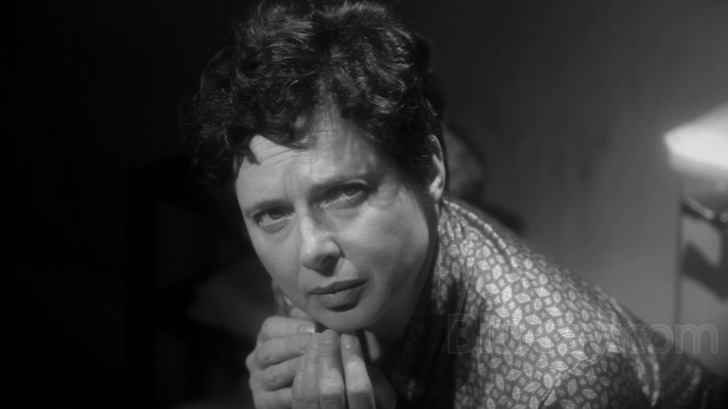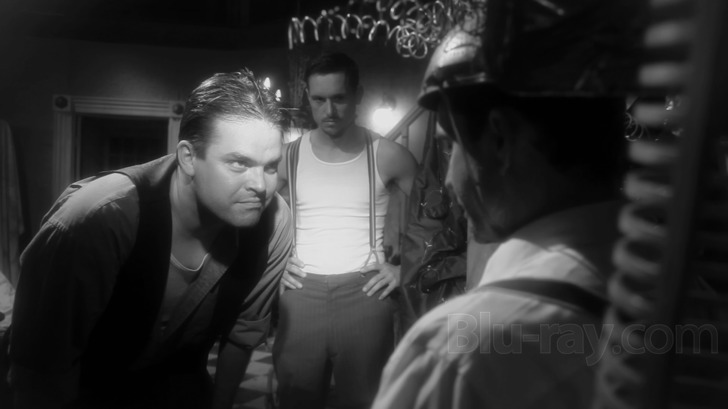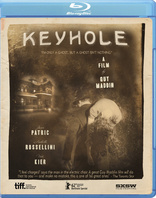Keyhole Blu-ray Movie
HomeKeyhole Blu-ray Movie 
Monterey Video | 2011 | 93 min | Rated R | Jun 19, 2012Movie rating
6 | / 10 |
Blu-ray rating
| Users | 0.0 | |
| Reviewer | 2.5 | |
| Overall | 2.5 |
Overview
Keyhole (2011)
In a house haunted with memories, gangster and father Ulysses Pick, arriving home after a long absence, must journey through the house, room by room, to reach his wife Hyacinth in her bedroom upstairs.
Starring: Jason Patric, Isabella Rossellini, Udo Kier, Kevin McDonald, Tattiawna JonesDirector: Guy Maddin
| Drama | Uncertain |
| Thriller | Uncertain |
Specifications
Video
Video codec: MPEG-4 AVC
Video resolution: 1080p
Aspect ratio: 1.78:1
Original aspect ratio: 1.85:1
Audio
English: DTS-HD Master Audio 5.1 (48kHz, 24-bit)
English: Dolby Digital 2.0 (192 kbps)
Subtitles
English
Discs
25GB Blu-ray Disc
Single disc (1 BD)
Playback
Region A (B, C untested)
Review
Rating summary
| Movie | 2.0 | |
| Video | 2.5 | |
| Audio | 3.5 | |
| Extras | 2.0 | |
| Overall | 2.5 |
Keyhole Blu-ray Movie Review
Maddin never makes it easy.
Reviewed by Brian Orndorf June 20, 2012The work of Canadian filmmaker Guy Maddin is best described as polarizing, with audiences near and far torn between a profound appreciation for the helmer’s stylistics and tributes to moviemaking processes of old, and his dedication to abstract thought, rarely embarking on a picture that isn’t moderately impenetrable. He’s not an artist to be embraced, but observed, especially when Maddin launches into his own orbit, recalling the early years of David Lynch, aiming to alienate a large portion of his audience with oppressive layers of interpretational cinema, meant to challenge the cineaste more than satisfy the average matinee warrior. Through efforts like “The Saddest Music in the World” and “My Winnipeg,” Maddin has built a brand name with his dedication to surrealism and magical happenings, typically slathered with expressionistic images pulled straight from silent cinema. He’s an acquired taste, though with “Keyhole,” the impish prankster is beginning to repeat himself.
Maddin’s latest is a ghost story of atypical fright, diving deep into the psychological abyss to inspire a tale of a house with many rooms. Inside these rooms are visions of the past and the present colliding with tremendous extrasensory force, creating a purgatory of sorts for the director to play with, using visions and violence as Play-Doh to build a domicile of desperation. It’s an exhausting feature, richly made yet punishing and baffling in a manner that doesn’t invite further discussion. I suppose Maddin fans wouldn’t want it any other way.

One stormy night, a group of gangsters and hostages enter a seemingly abandoned house. Made up of the living and the dead, the community of anxious Canadians eagerly awaits the arrival of Ulysses (Jason Patric). A hotheaded criminal with a shadowy past as an intense family man, Ulysses has dragged hostages Manners (David Wonter) and Denny (Brooke Palsson) into the spooky abode with him, demanding the young woman help him decipher the code of the house, despite her blindness and strange evidence of a recent drowning. While the cluster of agitated people figure out a plan to survive the night, Ulysses travels upstairs to find his estranged wife, Hyacinth (Isabella Rossellini), who’s locked herself in the bedroom, holed up with lover Chang (Johnny Chang) and father Calypso (Louis Negin), who’s been stripped naked and chained up. Heading from room to room, Ulysses struggles with household elements of madness and hauntings as he works toward an unknown goal, dealing with betrayals and memories of the family he once had as the extended evening of antagonism and personal reflection carries into dawn.
“Keyhole” is most certainly a puzzle, though one with a great number of pieces missing, kept in Maddin’s back pocket for safekeeping as viewers wander through this mystery of the mind without all of the necessary information. Influences from Greek mythology to Freudian prodding (one hallway is adorned with an erect penis that, according to Ulysses, requires dusting) are splattered all over walls of the house, while Maddin captures the wilting dreamscape in B&W, employing a vague inspiration from gangster movies of the 1930s as a starting point for the criminal activity hinted at during the initial moments of the picture. “Keyhole” is a phantasmagoria with a heavy Maddin limp, keeping the film mystifying beyond the basic elements of the story, with misted visuals creeping across the screen, while narration from Calypso creates something approaching structure, though it’s not a convincing pull of concentration, dissipating quickly after introduction. Much of the effort is indescribable, following Ulysses around the home, trying to broker a reunion with Hyacinth as he peeps through keyholes (always pulling out long strands of hair from the tiny openings), dragging Denny and Manners around the property as memories flash through his head, urging him to realizations or perhaps hallucinations he’s not prepared to confront. All the while, there’s an assortment of itchy personalities congregating on the main floor, who engage in redecorating, sex, and medical attention (Udo Kier appears as a doctor who’s recently lost his son to a wasp attack) as the night wears on.
Did I mention the stuffed wolverine named Crispy? The electric chair powered by bicycles? Ulysses’s genius plan to dump a box of firearms down into an incinerator? The boy who obsessively masturbates while the sound effect of shaking dice is played?
The oddness of “Keyhole” would be a total gas if it wasn’t so oppressive and elongated, dragged out interminably by Maddin as he dilutes the mystery with repetitive idiosyncrasy, keeping viewers in the dark for far too long. Also testing patience levels are the performances, as much of “Keyhole” resembles filmed community theater, with most of the cast failing to create a cinematic urgency that doesn’t come across heavily rehearsed. Granted, it must be difficult to communicate an interior life when boxed in by Maddin’s relentless pursuit of surrealism, but the ensemble flounders despite a few brave turns, including Negin, who’s completely nude and wrapped in chains for most of his screen time. When approaching a feature as opaque as this, a little personality goes a long way. Unfortunately, Maddin is more interested in his ghostly visions, editorial playtime, and symbolism than a full sense of emotional urgency, keeping the picture appreciable, but never enrapturing.
Keyhole Blu-ray Movie, Video Quality 

The AVC encoded image (1.78:1 aspect ratio) presentation wanders between troubling and ideal. There's a major problem with digital noise, with much of the cinematographic haze disrupted by banding issues, plaguing a majority of the presentation. Fine detail fares much better, with facial responses delivered clearly and effectively, displaying a wide range of skin imperfections and sweat-based reactions, while set design particulars are easily surveyed, keeping distances satisfactorily textured for ghostly observation. Only two moments of color are included in the picture, leaving a clean, balanced image highlighting bright whites and comfortably expressive blacks, with dense hairstyles and shadows kept in clear view. It's a strange viewing experience, moving from unsightly noise to welcome detail, leaving the BD event a little chaotic.
Keyhole Blu-ray Movie, Audio Quality 

The 5.1 DTS-HD MA sound mix is a dependable aural journey of sound effects and dialogue exchanges, though rarely does it elevate into a truly gripping sensorial experience. Surrounds are primarily reserved for atmospheric changes, with heavy rain and howling winds being a primary source of life to help envelope the listener into this troubled world. Scoring cues also wind around some, but less forcefully, keeping an appropriate distance from the verbal activity, which remains frontally pronounced with a firm grip on dramatic speeds and ghostly echo. Low-end is only moderately active, opening with a distinct rumble to pull the audience into the unsettling tone of the movie, only to trail off as the story unfolds, sporadically coming to life. Atmospherics are acceptable, offering distinct sounds of clanging chains and creaky house interiors.
Keyhole Blu-ray Movie, Special Features and Extras 

- "Send Me to the 'Lectric Chair" (7:02, SD) and "Glorious" (11:57, SD) are two short films from Maddin that represent the early stages of "Keyhole" development. Once imagined as a series of brief surrealistic stories, the moviemaker decided to build on the visual ideas presented here (some of them are sexually graphic) to create a feature-length version of the concept. Isabella Rossellini appears in the first short.
- "F-Hole" (4:09, HD) keeps in step with Maddin's work by presenting an exploration of the film's score through a blast of images and sounds, credited to Jason Staczek. Sadly, there's little to learn here, with the featurette reserved for fans of the feature.
- Video Montage (:16, SD) is a brief promotional clip.
- And a Theatrical Trailer (2:14, HD) is included.
Keyhole Blu-ray Movie, Overall Score and Recommendation 

Puzzlers and those slavish to the demands of analysis will likely find themselves overjoyed with the clues of "Keyhole." It's certainly a thoughtfully photographed motion picture, stacked with tchotchkes and shadowplay that possess deeper meaning, while nursing a moist sense of chaos with torrential rains and wet performers, adding to the noir mood. The ingredients are there for Maddin to bake a specialized effort of esoteric exploration, to take the house-of-a-thousand-secrets concept to a propulsive place of confrontation and revelation. Instead, "Keyhole" likes to linger on its achievements, placing the burden of comprehension on an audience not handed enough characterization and motivation to make the necessary educated guesses. Much like Maddin's previous work, "Keyhole" is beautiful but soulless, reserved for more daring, patient viewers able to compute ambiguity from a filmmaker who's made carrot dangling a fine art.
Similar titles
Similar titles you might also like
(Still not reliable for this title)

Kansas City
Arrow Academy
1996

Night After Night
1932

The Story of Temple Drake
1933

Live Like a Cop, Die Like a Man
4K Restoration
1976

Kidnapped
Rabid Dogs / Cani arrabbiati
1974

Ghost Dog: The Way of the Samurai
1999

Shanghai Triad
Yao a yao, yao dao wai po qiao / 摇啊摇,摇到外婆桥
1995

Chained for Life
2018

Diva
1981

Monos
2019

A Hijacking
Kapringen
2012

Dragnet Girl
非常線の女
1933

The Collector
1965

Like Rabid Dogs
Come cani arrabbiati / Wie tollwütige Hunde
1976

The Day of the Locust
Limited Edition
1975

Black Rainbow
1989

The Roaring Twenties
1939

Born for Hell
Naked Massacre / Die Hinrichtung
1976

The Watermelon Woman
1996

36th Precinct
36 quai des Orfèvres
2004
